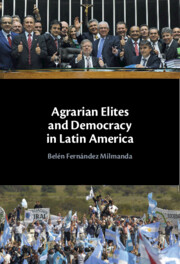
- Publisher:
- Cambridge University Press
- Online publication date:
- November 2024
- Print publication year:
- 2024
- Online ISBN:
- 9781009553551

This groundbreaking book delves into the underexplored realm of agrarian elites and their relationship to democracy in Latin America. With a fresh perspective and new theory, it examines the strategies these elites use to gain an advantage in the democratic system. The book provides a detailed examination of when and how agrarian elites participate in the electoral arena to protect their interests, including a novel non-partisan electoral strategy. By providing a deeper understanding of how democratic institutions can be used to protect economic interests, this book adds to the ongoing debate on the relationship between economic elites, democracy, and redistribution. Agrarian Elites and Democracy in Latin America is a must-read for anyone interested in politics, democracy, inequality, and economic power in the Global South.
Co-winner, 2025 Donna Lee Van Cott Award, Latin American Studies Association
Winner, 2025 Economics and Politics Best Book Award, Latin American Studies Association
‘Agrarian elites are often presumed to fear democracy because of the challenges it presents to their privileges and interests. But in many cases these elites not only survive but thrive in democratic environments. Drawing on rich interview material and primary documents from Latin America’s Southern Cone, this book lays out the tools elites turn to in order to get their way under democracy and when they are most successful. The author makes critical advances to the studies of democracy, inequality, and elite behavior.’
Michael Albertus - Professor of Political Science, University of Chicago
‘This is a path-breaking contribution to our understanding of business influence and democracy. The innovative theory and crisp analytical power of the political economy of landed elites is certain to redefine debates about democracy and development. A must-read for any scholar of political economy or Latin American politics.’
Maria Victoria Murillo - Professor of Political Science and International Relations, Columbia University
‘Agrarian Elites and Democracy in Latin America provides an innovative and deeply insightful explanation of an enduring puzzle in the comparative study of democracy: the ability of agrarian elites in highly unequal societies to defend their economic interests under democratic regimes that they do not support and cannot control. Through a comparative analysis of Brazil, Argentina, and Chile, Fernández Milmanda examines the conditions under which agrarian elites deploy electoral strategies by investing in party-building activities or building a multi-party legislative caucus and explains why they sometimes resort to less effective forms of social protest. This book is a major contribution to our understanding of why democratic regimes find it so difficult to adopt redistributive reforms and environmental policies opposed by elite economic interests.’
Kenneth M. Roberts - Richard J. Schwartz Professor of Government, Cornell University
 Loading metrics...
Loading metrics...
* Views captured on Cambridge Core between #date#. This data will be updated every 24 hours.
Usage data cannot currently be displayed.